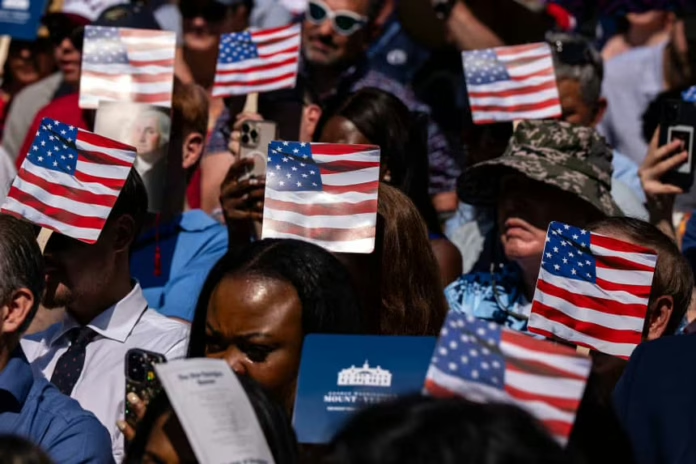CNN-The Trump administration is expanding the requirement for immigrants who are hoping to become US citizens to display “good moral character,” in a move that some immigration lawyers denounced as a troubling change that adds uncertainty to the naturalization process.
US Citizenship and Immigration Services, an agency within the Department of Homeland Security that administers the country’s legal immigration system, directed its officers in a memo last week to more heavily consider both positive and negative “attributes or contributions” of people going through the naturalization process to become US citizens.
The memo, which was sent to USCIS officers on Friday, requires them to take a more “holistic approach in evaluating whether or not an alien seeking naturalization has affirmatively established that he or she has met their burden of establishing that they are worthy of assuming the rights and responsibilities of United States Citizenship.”
The agency said in a statement that the new policy is intended to ensure its officers are accounting more heavily for an immigrant’s positive attributes, rather than simply the “absence of misconduct,” to reflect their character.
“U.S. citizenship is the gold standard of citizenship—it should only be offered to the world’s best of the best,” USCIS spokesperson Matthew J. Tragesser said in a statement.
The standard to show good moral character has long been part of the naturalization process in the US. But immigration attorneys told CNN that the memo is designed in a way that places additional burdens on people going through the process.
Emily Ryo, a professor of law and sociology at Duke University whose research focuses on immigration, said the “mandate is likely to introduce a great deal of uncertainty, unpredictability, and administrative burden.”
“What does it mean to require that a noncitizen ‘affirmatively’ establish that they are ‘worthy’ of US citizenship?” Ryo said in an email. “What kind of documentation will noncitizens be required to provide to make this affirmative showing, and how exactly are the officials to weigh and verify such evidence?”
Susan Ramos, an immigration attorney based in Arizona, described the policy change as “troubling” and said it “appears to effectively change the substantive requirements for naturalization without notice and comment, just by policy.”
“It creates a new subjective standard without providing the analysis that will be performed in adjudicating an application for naturalization,” Ramos said. “For example, how much volunteer work is enough to tip the scales in favor of the applicant? Who decides that formula, and using what analysis? What will USCIS consider sufficient achievement for someone who doesn’t work?”
And because the directive is broadly written, it makes it more difficult to challenge an individual officer’s decision on whether the character standard has been met, said Kathrin Mautino, a California-based immigration attorney.
“Generally, it will give individual officers more authority to ask about private lives,” Mautino said.
But the memo does contain some more concrete and stringent requirements for potential new citizens.
Previously, immigrants who owed overdue taxes were required to only show they were participating in a payment plan with the IRS to meet the character standard, Mautino said. But the new memo now requires the “full payment” of overdue taxes, as well as other obligations including child-support payments.
USCIS said in the memo this is to make sure immigrants “who have engaged in wrongdoing are properly rehabilitated and reformed.”
People who have multiple traffic tickets can now be found to lack good moral character, as well as people who engage in “harassment or aggressive solicitation,” though it is not clear what the memo means by that.
The updated policy is just one way the Trump administration is more heavily scrutinizing the lives of people applying for citizenship or for the right to live, work or study in the United States.
In late May, the US State Department ordered embassies to pause visa interviews for international students so they could more heavily scrutinize students’ social media. The pause was lifted after the State Department told embassies to screen for “hostile attitudes towards our citizens, culture, government, institutions, or founding principles.”
On Tuesday, USCIS announced that type of vetting will expand to seek out “anti-American” attitudes in those seeking immigration-related benefits such as the right to live or work in the US.


